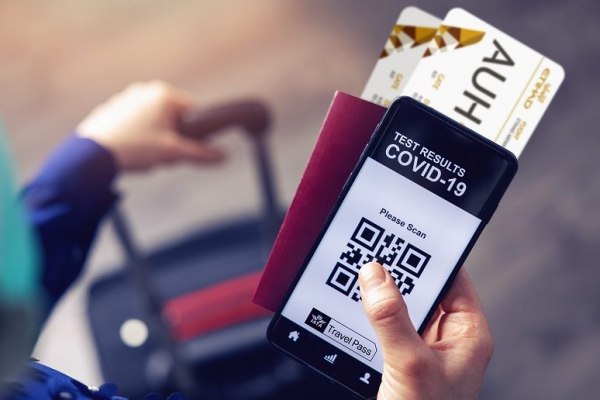Published on the 11/02/2021 | Written by Heather Wright

Where there’s a problem, there’s tech…
Where there’s a problem to be solved (or if we’re being cynical, where there’s money to be made) there’s a tech solution. So it’s no surprise that technology around vaccinations, from vaccine administration management solutions for business use to vaccine passports, is rapidly becoming a hot area.
A number of companies are currently pushing vaccine administration management for businesses locally, enabling companies to track staff vaccinations and ensure staff can return to the office, while globally companies, and agencies, are rushing to to develop vaccine ‘passports’. And around the world, governments are rushing to update their own vaccine management systems.
“Businesses need to ask themselves before they buy this sort of software, what the information enables them to do and should they do that.”
“We are starting to see some very targeted solutions aimed at not only the distribution but also Vaccine Administration Management offerings,” says Louise Francis, IDC New Zealand country manager. “It’s still a bit of a moving target as the developers of these solutions evolve quickly a the needs of the moment are addressed, much like the virus itself is evolving.
“Other than ServiceNow and Salesforce, we are seeing other examples of these solutions emerging as tech vendors partner with pharma. For example, Microsoft and Accenture are working with Zuellig pharma on a Covid-19 digital care platform, eZVax, which enables the co-ordination of mass vaccinations,” Francis told iStart.
“One of the benefits here with the emergence of these vaccination management systems is to deploy across other vaccination programs but also it provides a springboard for any future pandemics.”
The solutions often cover multiple technologies and cogs in the vaccination distribution wheel, from analytics and algorithms to triage and prioritise who gets the vaccine first to supply chain management, notifications and digital identity.
What is emerging as a success factor is integration with medical record systems.
“These types of solutions shouldn’t be considered short term, one use and then lie dormant until there is another major pandemic,” Francis says.
“Like all great solutions that emerge from a crisis, IDC expects these to be merged with other management toolkits. For example, how can this be extended to other vaccine rollouts?
“Flu vaccines traditionally have distribution and information management challenges even prior to Covid-19. How can the metrics from such as massive rollout be used by our R&D sector to develop NZ specific approaches – when you combine all that data and learning from the Covid-19 vaccination programme researchers will better understand how to approach vaccination programmes based on NZ behaviours and patterns. It can become highly personalised and effective.”
New Zealand’s Ministry of Health has been working for some time on a new National Immunisation Solution (NIS). It leverages the Ministry’s cloud platforms, specifically AWS and Salesforce.
A spokesperson for the Ministry of Health told iStart that system – which will initially be called the Covid-19 Immunisation Register ‘to focus the team on immediate priorities’ – is now up and running, albeit with further enhancements coming.
(In Australia, where vaccinations are expected to start later this month, the data will be entered into the existing Australian Immunisation Register, which has undergone ‘critical enhancements’, including increased capacity, the ability to record more detailed vaccine information and improved security. New legislation this month made it mandatory for all vaccination providers to record vaccinations in the register where previously reporting was at the discretion of the vaccination providers. That’s a move that no doubt ties to the country’s plans for vaccination certificates – more on that later.)
“During the year, we will further develop the system beyond COVID-19 so that it supports all vaccinations. It will then replace the existing National Immunisation Register (NIR) and become the NIS,” the New Zealand MoH spokesperson says.
The NIS will be able to prove vaccination for Covid-19 and confirm vaccination history, with any health worker able to record vaccinations, anywhere, any time, regardless of whether they are publicly funded or self funded.
“Over time, the goal is to enable members of the public to digitally access their own vaccination records.”
While there’s no doubt governments need vaccination management systems as they begin the largest ever vaccination programme seen, the use of vaccine management solutions for businesses isn’t so clear cut, despite vaccine management becoming a hot area in enterprise software.
As to be expected, it’s an area fraught with issues, including privacy concerns.
Says Francis: “The big challenge as with any technology handling personal information will be privacy, how their information is used/stored/discarded, and this boils down to trust.
“This is particularly important when businesses start to integrate these solutions with other employee data, potentially developing employee profiles – it’s a big area of concern, not just with this but any other type of solution that tracks employees behaviours.”
But there’s another wider issue too. In a word, it’s raising the prospect of discrimination against those who, for whatever reason, are not vaccinated.
Andrew Chen, research fellow with Koi Tū: The Centre for Informed Futures, isn’t convinced businesses need the software, particularly in the local context, and says businesses need to carefully consider why they would need a system to record vaccination status of staff.
“Businesses need to be asking themselves, before they buy this sort of software, what the information enables them to actually do and should they do that.”
Both the New Zealand and Australian governments have said the vaccine will be voluntary, indicating you can’t discriminate against those who haven’t been vaccinated. And Chen notes that for some – and not just the antivaxxers who have fallen down conspiracy holes – there are valid reasons not to have the vaccine, including health issues.
“So what sort of decisions would [the system] inform? The most obvious one is that unvaccinated employees shouldn’t come into the office.
“Then you get into the question of is that something you should do? Does having unvaccinated people around the office actually increase the risk? Does it create a different risk of ostracising employees from the office through something that may not be their fault, and so on?”
The question of where the vaccination status information will come from also raises a flag for Chen. It’s unlikely businesses will be able to access the Covid-19 Immunisation Register directly, leaving businesses relying on staff to provide the information as to whether they have been vaccinated, and at what stage of vaccination they’re in.
“Can a business make a decision again based on what may be partial or incorrect information.”
The fact that vaccines are not 100 percent failsafe also needs to inform decision making, he says.
While Chen says controlling access to workplaces for employees based on vaccination status is one are businesses may have control of, there’s the potential for it all to slide quickly into much murkier waters.
“The next step which is a bit more dubious, is controlling access for customers based on their vaccination status. It’s a very risky area I would hope businesses won’t engage in.”
The question of where data will be pulled from is a significant challenge not just for vaccine management solutions, but for vaccine passports – another current hot area.
Setting up the standards required for international interoperability between each jurisdictions system normally takes years.
“They are having to do this at an accelerated pace in comparison to usual.
“I think domestically, we should be ok, because the Ministry of Health will design a system that meets their needs and will be able to provide information to the people who need it, but the international element might be a bit trickier.”
So should we be aiming for a global database? That’s a definite no, says Chen.
“I don’t see one single global database being created because of the privacy and security risks of that.
I would imagine that every jurisdiction will have their own database and then there will be APIs that can be queried with appropriate security and authorisation protocols so that only the data that needs to be requested is provided, rather than there being a global database.”
Despite plenty of uncertainty – and indeed a lack of any real definition of what exactly will constitute a vaccine passport – tech companies are racing to develop passports or certificates to enable those who have been vaccinated to prove their health credentials.
Microsoft, Salesforce and Oracle recently joined the Vaccination Credential Initiative which is seeking to create a ‘health wallet app’.
In Australia, anyone vaccinated will receive vaccine certificates via the My Gov Express Plus Medicare app, or hard copies for those without smartphones, drawing on the data in the Australian Immunisation Register. The government has said it is ‘highly likely’ certificates will be needed for travel into the country.
In New Zealand, where border staff will start receiving vaccines next week, the government has so far been non-committal to vaccine passports.
Governments in Estonia, Hungary and Iceland have already signed up to pilot one offering, VaccineGuard from European ‘deep tech’ company Guardtime, in collaboration with the Estonian Government and the World Health Organisation. It’s a platform which has won favour with AstraZeneca Estonia which is also participating in the pilot, enabling an end-to-end solution.
The platform will connect all the parties from vaccine manufacturers to hospitals, public health authorities, certificate providers, wellness app providers, citizens and border guards to vaccination programme managers and even insurance companies, Guardtime says.
“By enabling these participants to share data, and verify its authenticity across organisational boundaries and international borders, VaccineGuard enables real-time insights, pharmacovigilance, counterfeit detection and many other benefits enabling a faster and reliable pandemic response.”
In the UK there’s been a long-running debate on whether vaccine passports should be introduced. Downing Street has said it has no plans to roll out passports for use in the UK, with vaccine minister Nadhim Zahawi going so far as to say the passports would be ‘discriminatory’ and that it’s not clear what impact they would have on the transmission of Covid-19. Transport secretary Grant Shapps, however, has said the UK is in talks with other governments, including Singapore and the US, about an internationally recognised systems and standards.
For governments there’s more at stake, with pressure for speedy – and efficient – vaccine programmes and concerns over counterfeit vaccines. VaccineGuard’s offering harnesses blockchain, with manufacturers serialising the vaccine vials so they can be tracked to the point of administration.



























